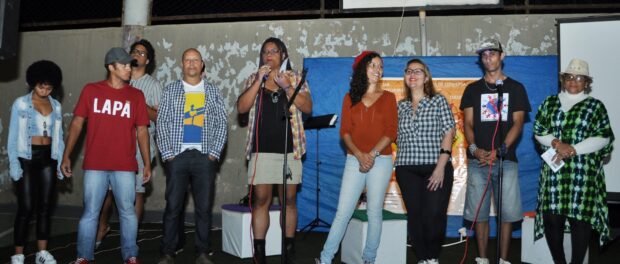
August 19 was a day of environmental awareness: the soiree hosted movies, poetry, and culture for the residents of Sepetiba in the community of Nova Sepetiba, in Rio de Janeiro’s extreme West Zone. The neighborhood of Sepetiba, founded in 1567, served as support for the Portuguese colony. Its beaches were ports for the exportation of Brazilian wood to Europe and they were visited in the summer by the royal family. In the 1970s, these same beaches were frequented by millions of sunbathers and compared with the famous Copacabana beach. Today, Sepetiba suffers from public neglect and from the total degradation of its beaches.
The theme of this edition of the Estação 67 Soiree, a bimonthly event organized by the NGO Diverse Territories Movement (Movimento Territórios Diversos—MTD), was “Sepetiba in Scenes,” which dealt with the degradation of the Sepetiba Bay. Its principal attraction was the screening of the film Cada Vez Mais Longe (“Further and Further Away”), from directors Eveline Costa and Oswaldo Eduardo Lioi.
The film depicts the silting process of the Sepetiba Bay—which was once considered to be Brazil’s second highest-producing fishery—through the story of the characters João, a fisherman, and Isaura, his wife. The work is an environmental critique that portrays the pollution that has only become worse since the 1960s with the installation of the Santa Cruz Industrial Zone and growing industrialization in neighboring municipalities.
After the screening of Cada Vez Mais Longe during the soiree, there was a discussion with the directors and one of the film’s producers.
Director Eveline Costa affirmed that the screening of the film in the Sepetiba region was crucial. “We are very happy with the invitation. I think that this movement, this soiree, is something absolutely necessary. For me, the film would not be complete if we did not bring it and show it in this community, in this region, and with all of the force that MTD is providing. I think this is fundamental information for people who still do not know about the damage which, although irreversible, we cannot let advance further,” she said.
Director Oswaldo Eduardo Lioi spoke about the experience of showing the film at the soiree: “I think the Estação 67 Soiree is an incredible initiative. This level of participation should be multiplied because the more you embrace your own causes, the more you change, the more you own. We were very happy to have come so close, to have participated in this grand event. The film was a major motivation to return to the place where we shot the images, and bringing it here makes a huge difference. Now is the time to come together, because Sepetiba is a whole, it cannot be a part.”
Emanuelle Borba—one of the film’s producers, a resident of Sepetiba, and director of the Radio Age Cultural Space (Espaço Cultural A Era do Rádio) located in Sepetiba—declared in her contribution that “it was a beautiful screening.” She continued: “We were waiting for this opportunity for years. The film was made with a lot of care in 2010, it was an independent production with the collaboration of many producers. With poetry and in a delicate fashion it tells the story of the devastation of a beach, the Sepetiba Bay that suffered severe consequences of pollution and was abandoned by our nation’s leaders. Estação 67 Soiree brought this work to the neighborhood and facilitated the emotional meeting to transform and reinvent peripheral visions.”
During the conversation, Igor Rosa, a teacher and resident of the neighborhood, spoke about the relationship between the film and the reality of residents: “To go further and further away is not a survival mechanism only for fishermen; other residents need to travel further in order to find better employment, quality schooling, and cultural attractions. It so happens that Sepetiba is the neighborhood furthest from Rio’s Centro region, and it has precarious public transportation, no cinema, no theater, and no mall. Because of this, initiatives like that of MTD are an oasis. It is in this way that the Sepetiban public continues resisting, producing culture, and discovering forms of self-reinvention.”
The Estação 67 Soiree presents a concept of a multicultural soiree that, in addition to poetry, brings film, theater, music, dance, and other cultural expressions to the public. Flávio Brandão, a supporter and the bridge between MTD and film directors, classified the event as a historic moment: “It is a historic moment, a moment that symbolizes the union of the old Sepetiba with the new Sepetiba. I think that this film was something marvelous that provides this path for union and each person who was here will pass it on to their children, their parents. The path is this—a great seed being planted that is worth each task and each second.”
The Diverse Territories Movement – Cultural Association is a non-profit entity that concentrates its actions in the community of Nova Sepetiba, Rio de Janeiro. The organization promotes activities targeted towards cultural, artistic, educational, and socio-environmental areas. Elizabeth Manja, the creator and manager of the NGO, affirms that these actions are proposed with the objectives to mobilize, raise awareness, and promote appreciation of the Sepetiba neighborhood as a whole.
Márcia Jesus is a resident of Paciência in the West Zone and a journalist trained at the Castelo Branco University (2014). She was an intern at the Rádio Nacional for two years. Currently, she works in third sector communications, such as social media for the NGOs Movimento Territórios Diversos and Ser Cidadão. She specializes in Design and Digital Marketing.




